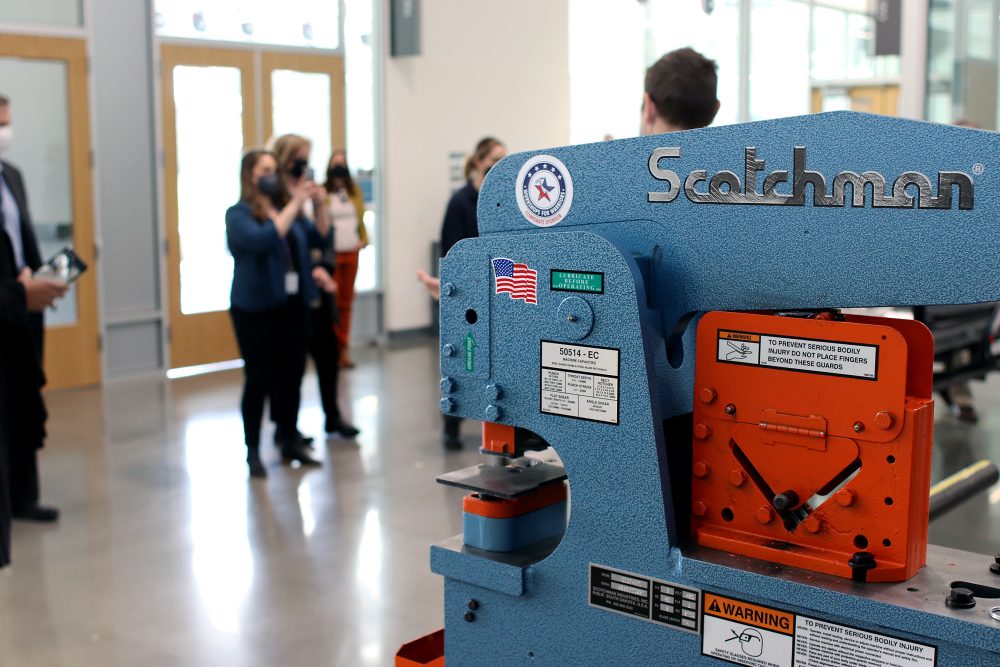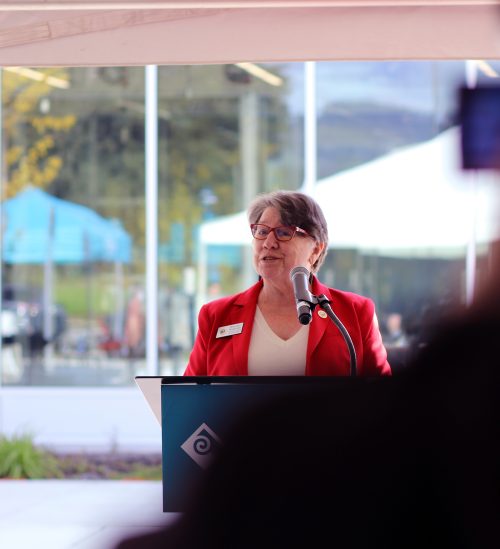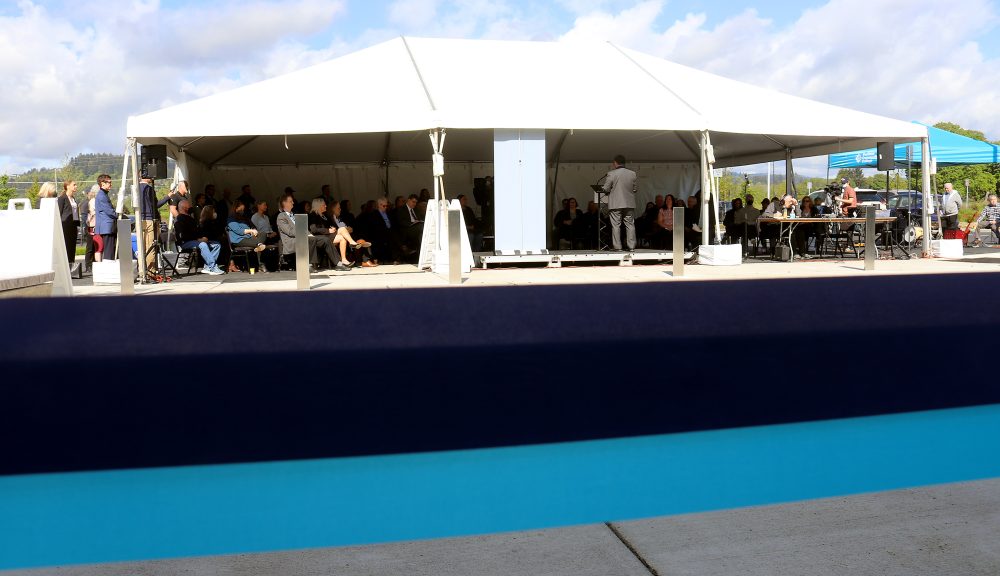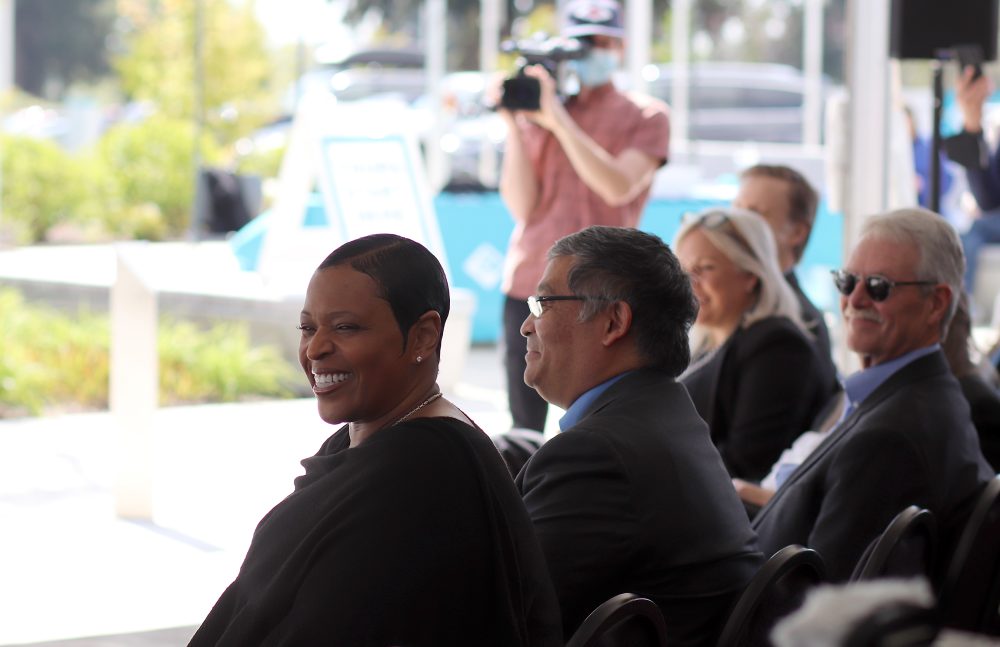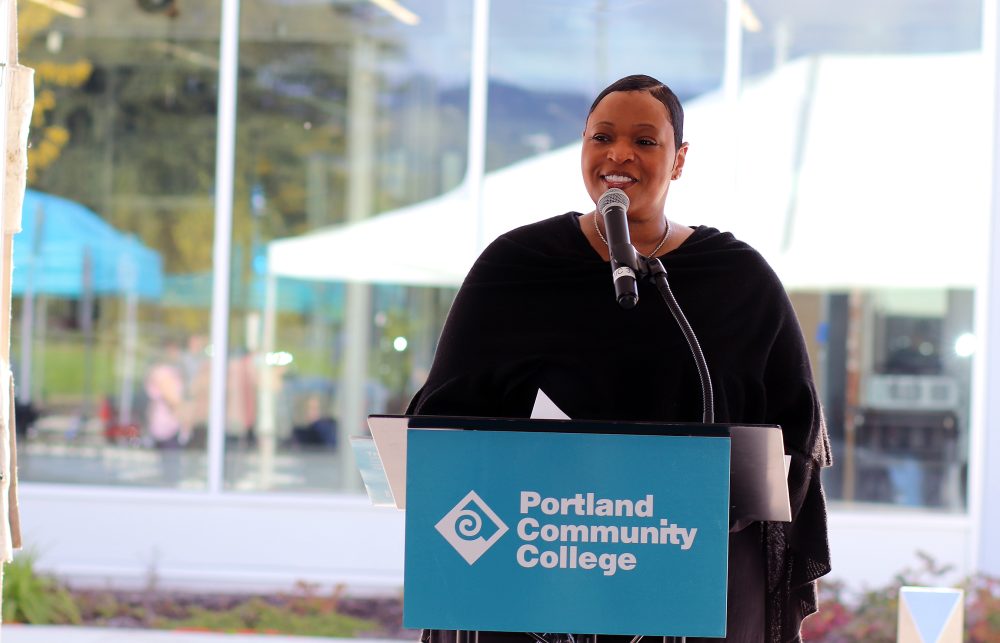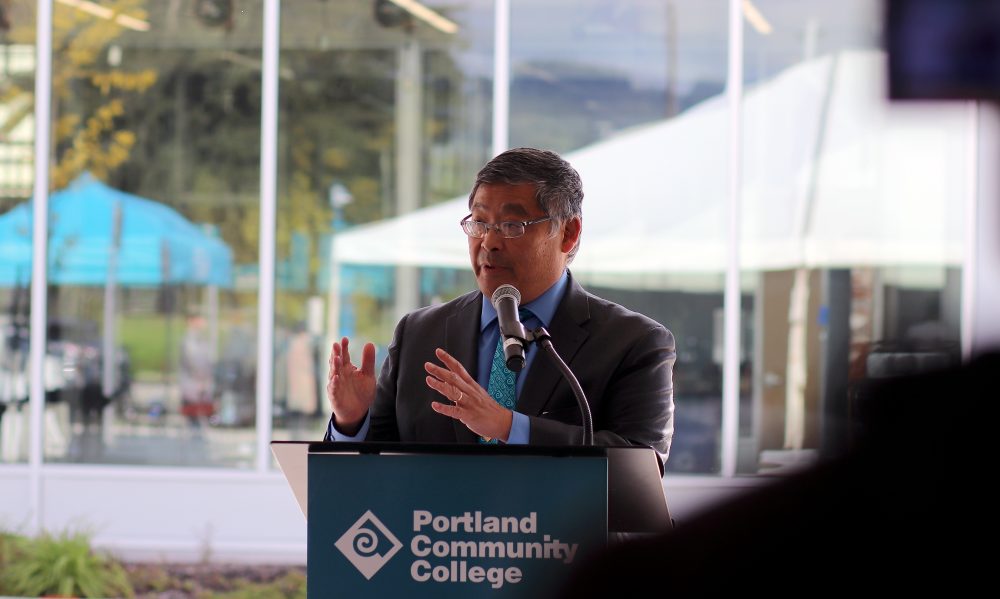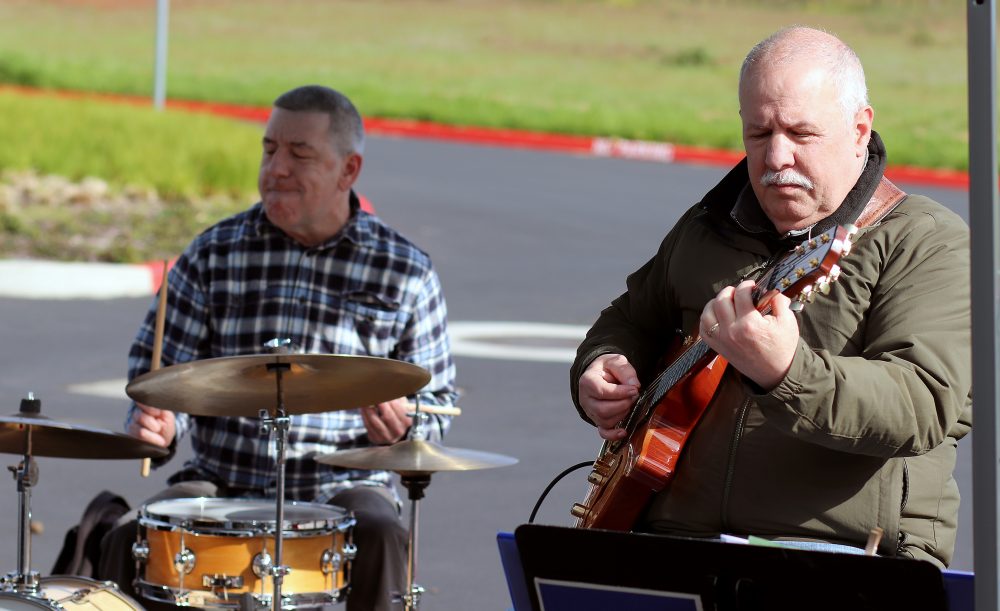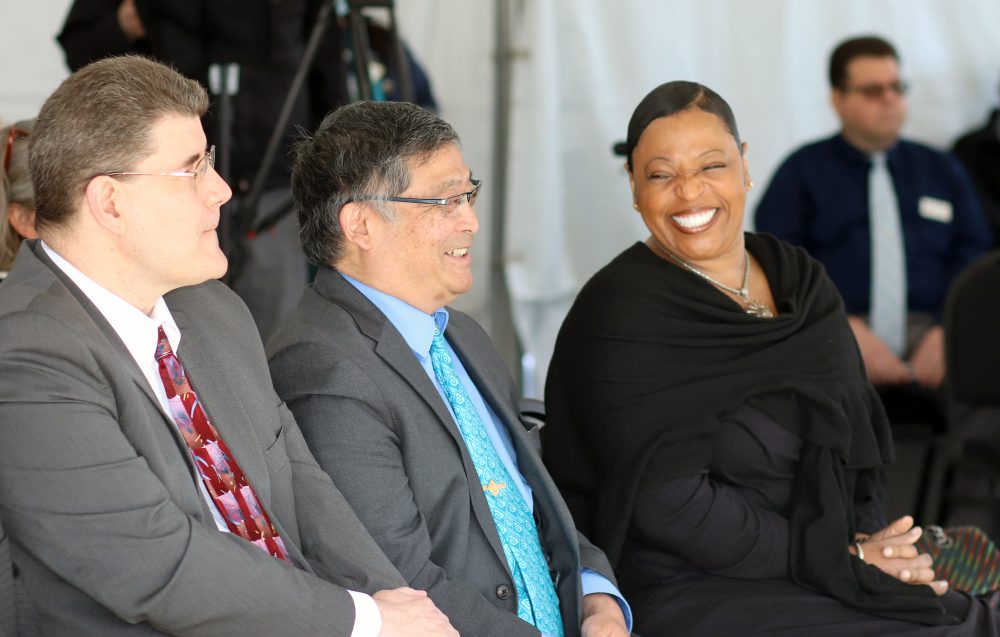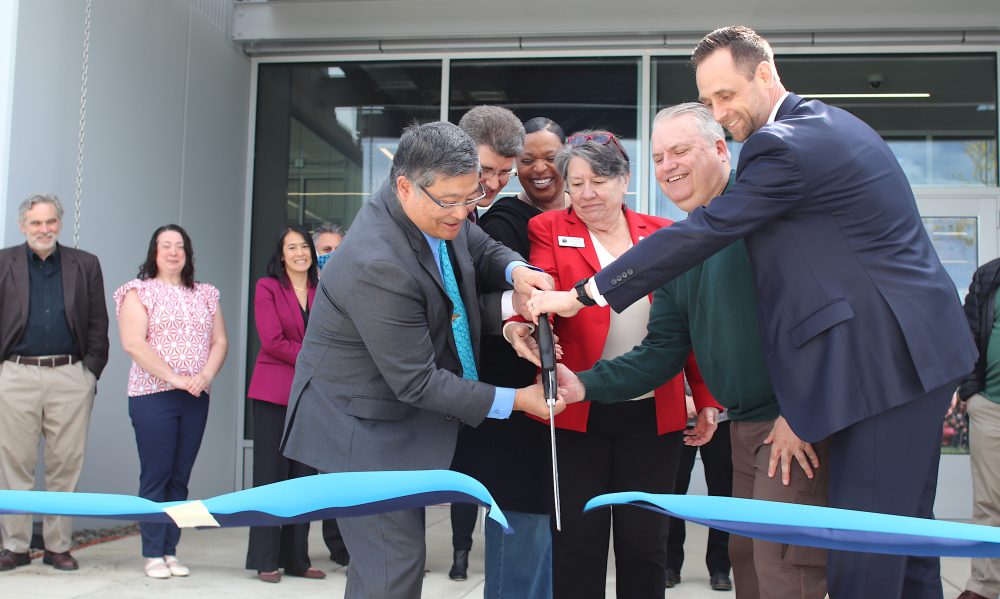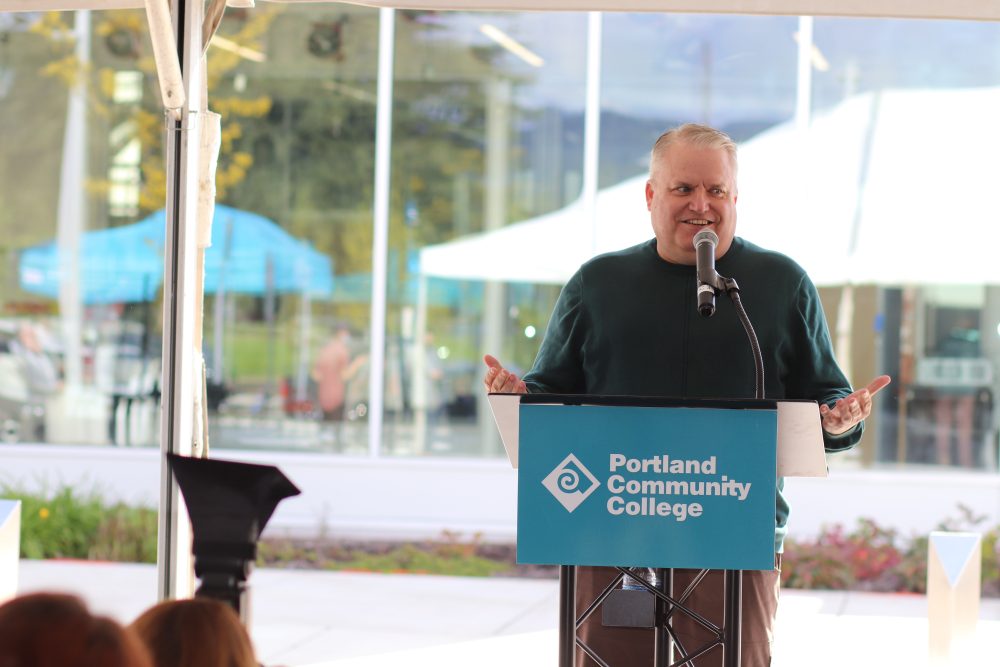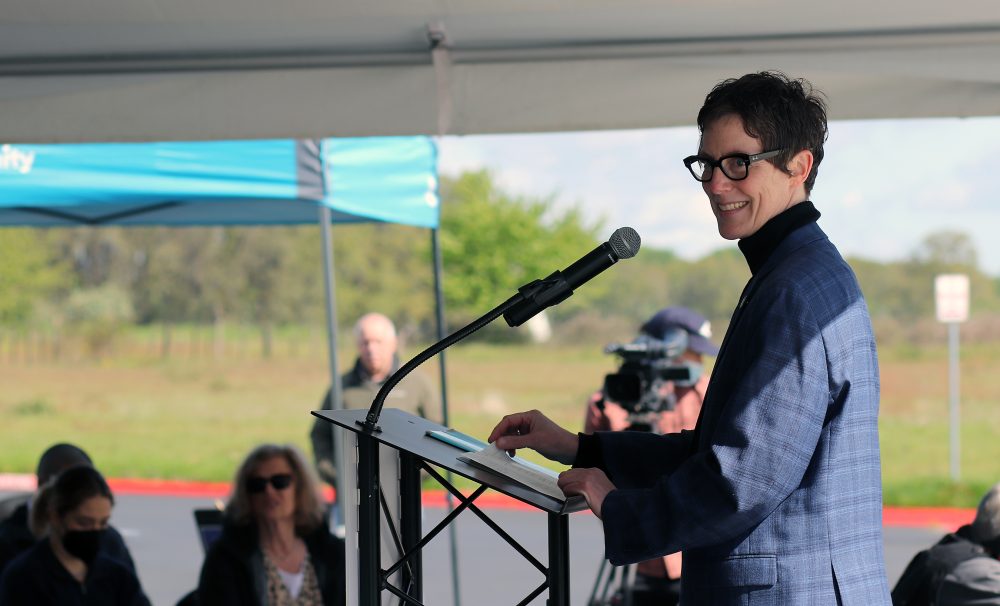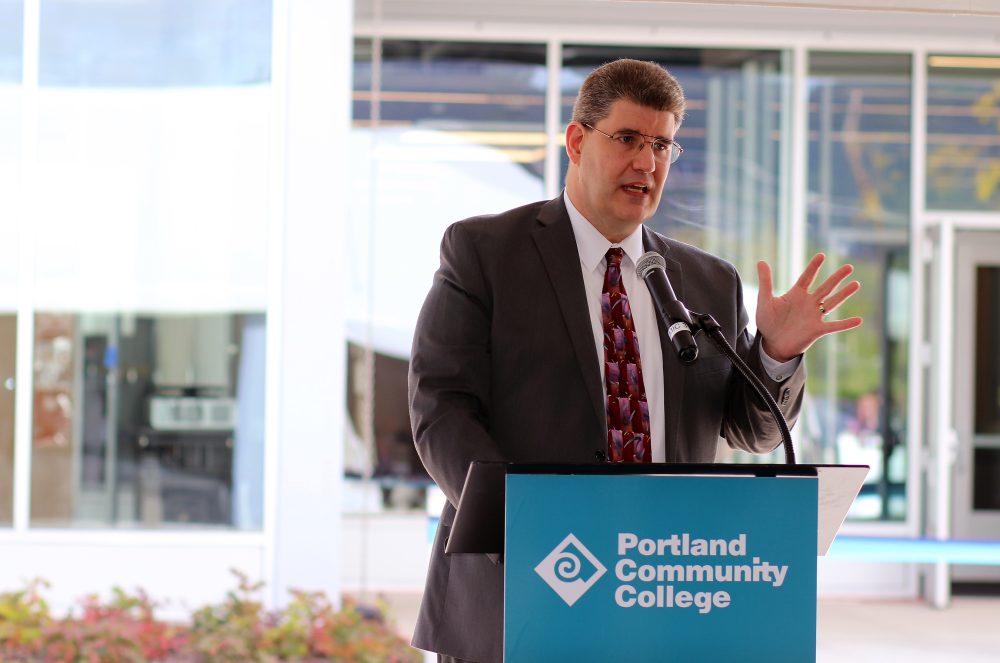This content was published: May 23, 2022. Phone numbers, email addresses, and other information may have changed.
After pandemic delay, PCC celebrates first advanced manufacturing center
Story & Photos by James Hill & Alfredo Moreno. Video by Ric Getter.
The COVID-19 pandemic may have delayed the ceremonial ribbon-cutting until this spring, but Portland Community College’s Oregon Manufacturing Innovation Training Center is now open for classes and receiving the attention it deserves.
On Wednesday, May 11, leaders from across the region and Columbia County celebrated the official ribbon cutting of the region’s newest advanced manufacturing training center. The event featured music by the Scappoose Choir and Jonathan Smith Trio, as well as speakers PCC President Mark Mitsui, OMIC Training Center Director Andrew Lattanner, Columbia County Commissioner Margaret Magruder, OMIC Research and Development Executive Director Craig Campbell, PCC Board Vice President Tiffani Penson, Scappoose Mayor Scott Burge and PCC Dean for Mechatronics, Electronics & Advanced Manufacturing Technologies Carrie Weikel-Delaplane.
The center is the educational arm of the Oregon Manufacturing Innovation Center (OMIC) initiative — a collaboration of industry, higher education and government that combines applied research and development and workforce training.
PCC’s facility is traditionally known as the OMIC Training Center and is located at the Columbia County Center (34001 NE Wagner Ct. in Scappoose). It is PCC’s first permanent, physical location in the region and the college’s first building fully dedicated to providing training for the advanced manufacturing trades.
“The new PCC OMIC Training Center is a building purposely designed to replicate a real manufacturing environment that will provide students with the type of experience they will see in the real world,” said Andrew Lattanner, OMIC Training Center director. “This building and this initiative is rooted in collaboration. Our progress to date and our continued success is based on partnerships.”
Locally, Oregon’s manufacturing industry reports a need for shorter, quicker training programs to keep up with change and to engage more young people in these careers. PCC’s 32,000-square-foot advanced manufacturing training facility supports both traditional and work-based learning models like registered apprenticeship, pre-trades programs and internships. The facility, which opened its doors last fall, also provides introductory, intermediate and advanced training in computer numerically controlled (CNC) lathe operation, CNC mill operation, welding and fabrication and other areas of advanced manufacturing.
In addition, PCC offers “On Ramp to Manufacturing” courses at the site for area residents. “On Ramp” is a no cost, three-week series of classes designed for people interested in working in advanced manufacturing. These non-credit, introductory classes help participants make informed decisions about their careers, build skills for success in school or on the job and access support on their journey to becoming a PCC student.
“We see this facility as the starting point, and a really important one, to bring the power and promise of the transformative potential of higher education and training,” said PCC President Mark Mitsui. “We are officially opening a facility where we will be able to have leading edge skills provided through education and training that will produce leading edge workers for our companies and corporations to be globally competitive. That is not only important for the United States economy, but also the economic mobility of the folks that live in our region.
“The OMIC initiative, and the PCC OMIC Training Center, is an opportunity for us to work together to build pathways for students to good paying jobs – jobs that fill a critical need for our companies and produce economic mobility in our communities,” he added
PCC promotes sustainable design principles for all of its bond-funded work, which is an integral part of the college’s goals to meet its Climate Action Plan. The OMIC Training Center features the latest sustainable design features, which resulted in it earning LEED Silver in 2021. The open and spacious design allows for plenty of room for programs and classes. Interior windows also allow plenty of light into the center’s classrooms, expansive group study areas and collaboration rooms.
To enroll in any of the OMIC Training Center’s programs or classes, visit the PCC admissions website: www.pcc.edu/enroll/
Quotables:
“Training Oregon’s young people to fill in-demand, 21st century jobs is critical to fuel our economy and tackle the state’s shortage of skilled workers, especially in rural communities. The new OMIC Training Center in Scappoose will prove invaluable in achieving this mission. I am excited to see how the federal investments Senator Ron Wyden and I secured for the training center will help supply students in rural Columbia County with the equipment they need to advance their career and technical education to become the next generation of skilled manufacturing workers.” – Oregon U.S. Senator Jeff Merkley
“Workforce training programs are a path to good-paying jobs for many Oregonians, and I am glad to see a local initiative like Portland Community College’s OMIC Training Center flourish here in Columbia County. Students at PCC’s OMIC Training Center learn the skills needed to enter the manufacturing workforce, all in partnership with industry leaders like Boeing, Daimler and PGE. I remember when the PCC OMIC Training Center was just an idea and an open field: now, there stands a beautiful high-tech facility training the advanced manufacturing workforce of tomorrow.” – U.S. Congresswoman Suzanne Bonamici
“Community colleges breathe life into communities by offering students courses that make them job ready. Not just providing a degree, but something that assists them to walk out the door and go to work in high-paying, high-quality jobs. Community colleges provide meeting space, partnerships with local school districts and a feeling of hope for those who may not have the resources for a university education. They break down barriers, such as access to transportation, and since they’re local, they’re right here where we live. All of this will certainly become an important benefit to the economic development of Columbia County, create more opportunities in Columbia County, and, over time, will help to generate more local jobs, so that fewer workers need to travel to Portland and other neighboring communities to support their families.” – Columbia County Commissioner Margaret Magruder
“One of the things that Scappoose is now going to be about is advanced manufacturing, research, development and training, which is something to be proud of, and something that really identifies what we’re doing and where we’re going. I couldn’t be more proud of having helped to work on this project and helped create a future for the city, the county and the state of Oregon.” – Scott Burge, Mayor of Scappoose
“This project exemplified collaboration and innovation from the very beginning. The college planned for a teaching facility that would meet current and future demands in advanced manufacturing technologies. The project team delivered this on schedule and on budget – four words in construction you want to hear – ‘on schedule’ and ‘on budget’.” – PCC Board Vice President Tiffani Penson, who represents Columbia County
“Columbia County is probably the only place this could have happened. What you have in this community is a group of people who want to get things done and are willing to think outside the box in order to make that happen. That is exceptionally rare. The work that’s going to be done here will be a stepping stone for so many people who are looking to get the skills that will provide them with an opportunity to get a great job and support their family.” – OMIC Research and Development Executive Director Craig Campbell
“This center is more than a building. It’s a community space. It’s a place of hope, a place of progress, fearless iteration, and determination, just like the incredible people of Columbia County.” – PCC Dean for Mechatronics, Electronics & Advanced Manufacturing Technologies Carrie Weikel-Delaplane

